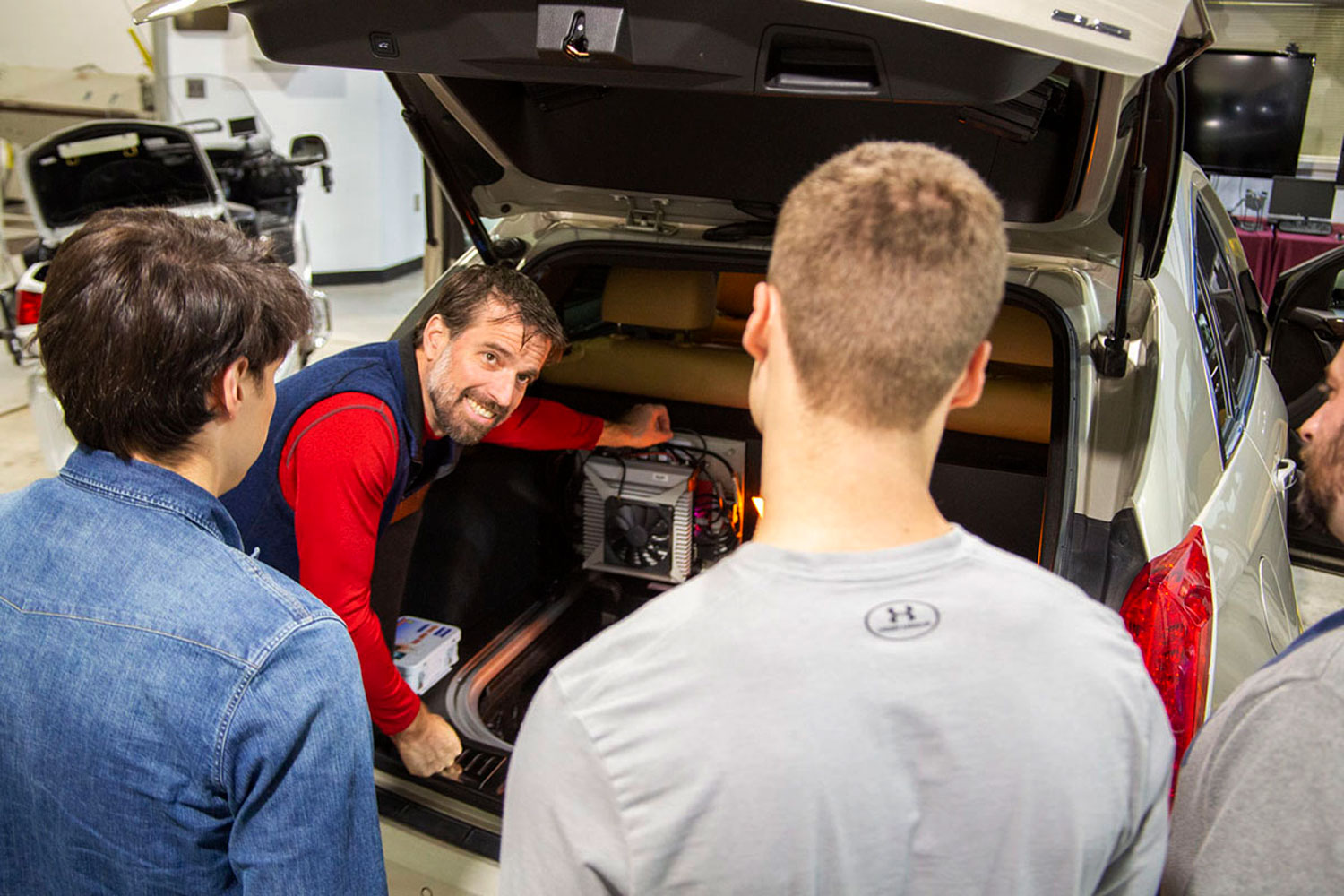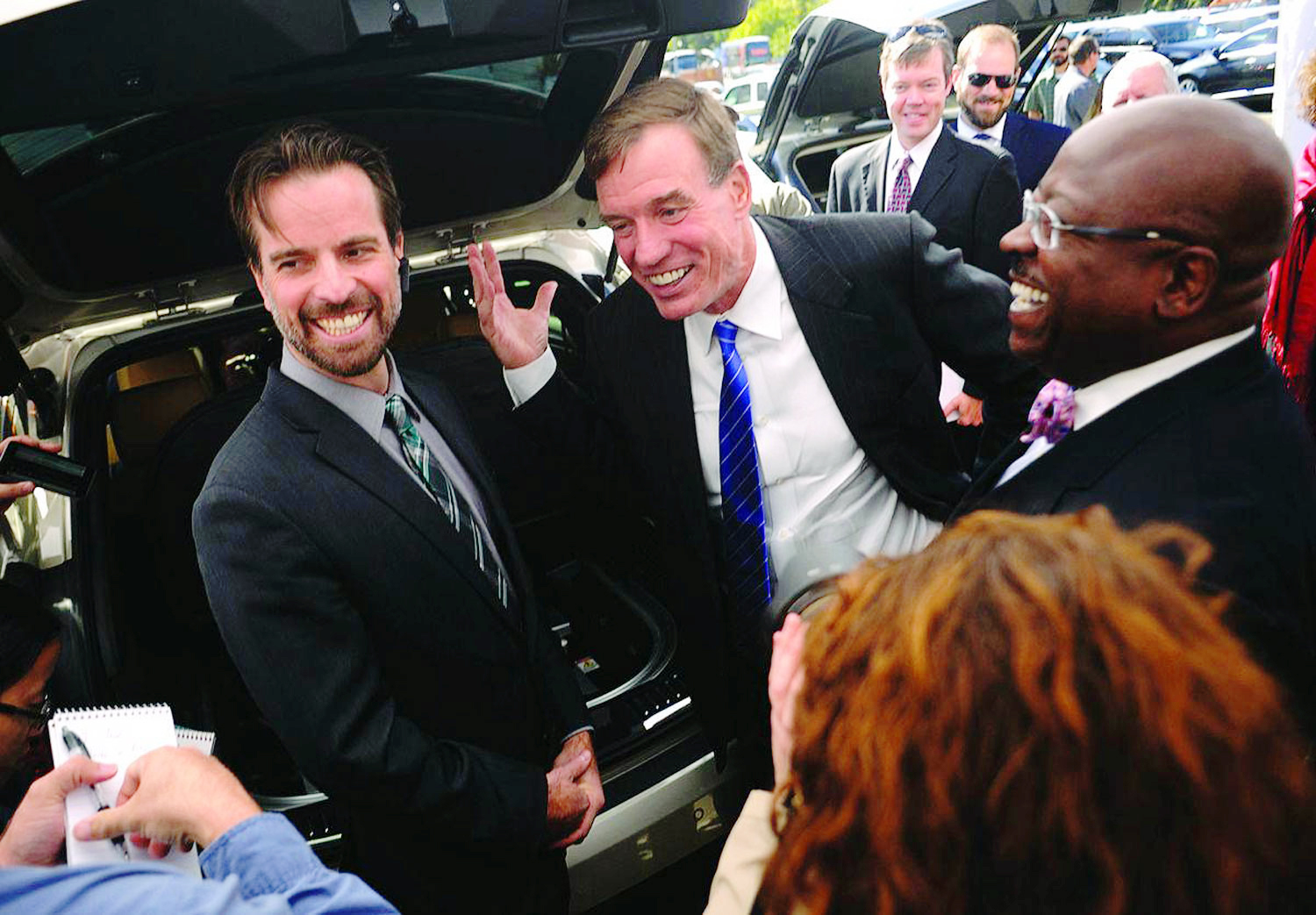Zachary Doerzaph appointed Virginia Tech Transportation Institute's executive director
In his prior position as the director of VTTI’s Division of Vehicle, Driver, and System Safety, Doerzaph guided a team of 62 faculty, staff, and student researchers.

After a national search, Zachary Doerzaph has been appointed executive director of the nation’s second largest transportation institute — Virginia Tech Transportation Institute — effective Oct. 1, 2021.
“Zac Doerzaph is a nationally recognized transportation researcher with extensive leadership experience in large team projects from different sponsors. His intimate knowledge about Virginia Tech’s institutional culture made him the ideal candidate to lead the university’s largest research institute at this critical time,” said Dan Sui, vice president for research and innovation at Virginia Tech. “I am very excited about VTTI’s future under his leadership and am confident that his dedication and passion for the institute’s new vision will inspire faculty, staff, and students to move the organization to a new level of excellence.”
Doerzaph follows the legacy of Tom Dingus, the Newport News Shipbuilding Professor of Biomedical Engineering and Mechanics, who was VTTI’s director for 25 years and stepped down Aug. 1, 2021.
“The amazing people at VTTI have enhanced the field of transportation science, creating a legacy of positive impact for our communities. With the arrival of new technologies and services, transportation is undergoing a period of unprecedented change,” said Doerzaph. “Our extraordinarily talented team will leverage these changes to maximize the benefits of future driver, vehicle, and infrastructure systems toward an ultimate future with ubiquitous safe and effective transportation for the communities we serve. I am extremely honored to guide the team through this exciting time and look forward to realizing our shared accomplishments.”
In addition to leading the largest group of driving safety researchers in the world, Doerzaph will also take on the role of president of VTT LLC, a nonprofit, university-affiliated corporation of the Virginia Tech Foundation that operates the Global Center for Automotive Performance Simulation in Halifax County, Virginia.
Doerzaph, also associate professor of biomedical engineering and mechanics, will oversee the university’s largest research institute, which conducts more than 300 research projects in partnership with more than 100 public and private organizations to improve transportation safety nationally and globally. The institute historically has approached $50 million in externally sponsored awards and accounts for 12-15 percent of sponsored research at Virginia Tech.
Over Doerzaph’s professional career, his research focus has been on measuring and improving the performance of next generation vehicle systems. His research projects emphasize safety as it relates to the interactions between the driver, vehicle, and infrastructure with local, state, national, and global implications.

“We are incredibly pleased with the selection of Zac as the next executive director of VTTI,” said Cathy McGhee, director of research and innovation for the Virginia Transportation Research Council, Virginia Department of Transportation (VDOT). “Our long-standing relationship with the institute has provided tremendous value to VDOT. Zac's expertise has been particularly important as we navigate the transition to connected and automated vehicles and what the technology can bring to Virginia in terms of improved safety and mobility. We look forward to working with Zac across the full spectrum of VTTI capabilities as we build, maintain, and operate Virginia's top notch transportation system.”
Doerzaph’s nationally recognized research portfolio has resulted in extensive collaborations with policymakers, infrastructure owner operators, and the automotive and transportation industry. His team often works with public private parthernsips, including a portfolio of connected vehicle studies dating back well over a decade with the Crash Avoidance Metrics Partnership, Virginia Department of Transportation, and the United States Department of Transportation. He also works alongside numerous automotive manufacturers and a broad array of suppliers to develop and evaluate their prototype technologies prior to public announcement or production release.
“Zac has a long history of working collaboratively with GM and the automotive industry through advanced proprietary work that contributes to the development of many vehicle safety systems,” said John Capp, director of vehicle safety technology, strategy, and regulations for General Motors. “I’m very pleased to see Zac selected for this leadership role.”

Stefan Duma, executive director of Virginia Tech’s Institute for Critical Technology and Applied Science, led the search committee representing researchers, government relations, administration, and faculty.
“Zac has the technical skills and leadership style that make him a great fit for the next leader of VTTI,” said Duma. “As the largest institute at Virginia Tech, the continued success and growth of VTTI is critically important to Virginia Tech’s research mission. I am grateful that Zac has accepted this important role. I also want to thank the search committee for all of their time over the past few months during this recruitment process.”
In his prior position as the director of VTTI’s Division of Vehicle, Driver, and System Safety, Doerzaph guided a team of 62 faculty, staff, and student researchers who apply cutting-edge scientific methods to design, develop, refine, and evaluate solutions to complex transportation challenges; focusing on applications to improve the safety and effectiveness of transportation systems for the broad range of users.
Doerzaph testified to the Senate Committee on Environment and Public Works on the effects of automated technology on the nation's roads and bridges, informing policymakers. In a June 2018 testimony, he shared that large-scale deployment of automated vehicles will take decades to achieve with a significant percentage of manually driven vehicles on the roads for the foreseeable future. Doerzaph said that recognizing and designing for these mixed fleets is critical to ensuring safe and effective transportation in the future.

The National Academies of Science, Engineering, and Medicine published the first national guidelines for using light-emitting diode (LED) lamps to light U.S. roadways based on work led by Ron Gibbons, who leads the Infrastructure Based Safety Systems group at VTTI, and other researchers within Doerzaph’s division.
Currently, Doerzaph leads a large grant with San Diego State University and the Texas A&M Transportation Institute in collaboration with other public and private partners under the Safety through Disruption (Safe-D) National University Transportation Center, supported by a grant from the U.S. Department of Transportation Office of the Assistant Secretary for Research and Technology University Transportation Centers Program.
The Safe-D project enables scientists to proactively conduct critical research on emerging transportation technologies and approaches and has funded over 90 research projects focused on four interconnected transformative technology themes, including automated vehicles, connected vehicles, transportation as a service, and big data analytics.
Through disseminating Safe-D project results using a robust technical transfer process, Doerzaph and VTTI colleague Feng Guo were able to provide open-source data that impacted Google’s recently unveiled safety feature. As a result, Google Maps now reroutes drivers around identified road segments where they tend to slam on their brakes. In an interview with Fast Company, Director of Product Russell Dicker said that Google began by delving into research on the topic of hard-braking incidents and directly correlated it to VTTI's work.
Doerzaph’s Vehicle, Driver, and System Safety Team have also implemented several programs to educate teenage drivers and their parents on safe driving behaviors, including the Virginia Licensing Ceremony and teen driver monitoring feedback system developed by Charlie Klauer, who leads the Training Systems group at the Virginia Tech Transportation Institute. With Safe-D collaborators at San Diego State University and Justin Owens, research scientist at VTTI, Doerzaph co-created www.kidsridesafe.org to educate parents on the various state rules regarding using child seats in rideshare vehicles.
Doerzaph’s research also engages Virginia Tech students. He mentors 13 graduate students on advanced research projects and provides hands-on learning opportunities to undergraduate students through capstone design projects. With Doerzaph’s guidance, a group of grad students voluntarily expanded their semester project by developing a novel vehicle safety system. In 2019, they submitted their concept to the Enhanced Safety of Vehicles Student Competition, taking first prize and earning the title of international champions.

Additionally, VTTI’s InternHUB, an advanced experiential learning program focused on accelerating practical skill development for the next generation of transportation professionals, is the result of the hard work and dedication of furthering student development put forward by Doerzaph, the founding director. Students work for transportation companies while in school, developing next generation technologies within a fast-paced environment that parallels the experience, and associated pressures, of an industry job.
Today, VTTI is a top three transportation institute globally. Institute faculty members currently publish about 150 journal articles per year, including in high impact-journals like the New England Journal of Medicine, The Proceedings of the National Academies of Sciences, JAMA Pediatrics, the International Journal of Epidemiology, and the Journal of Public Health, in addition to transportation and safety specific journals.
The institute houses several national centers, including the $28 million Safety Through Disruption University Transportation Center and the National Surface Transportation Safety Center for Excellence, which was established in 2006 with the assistance of then U.S. Sen. John Warner and has generated $15 million in research to date.




